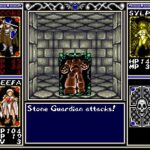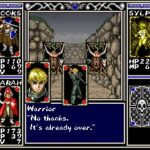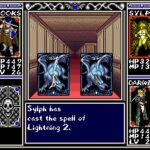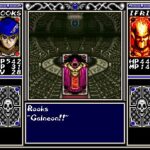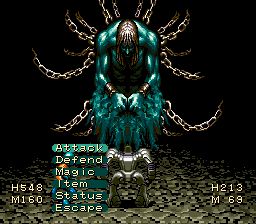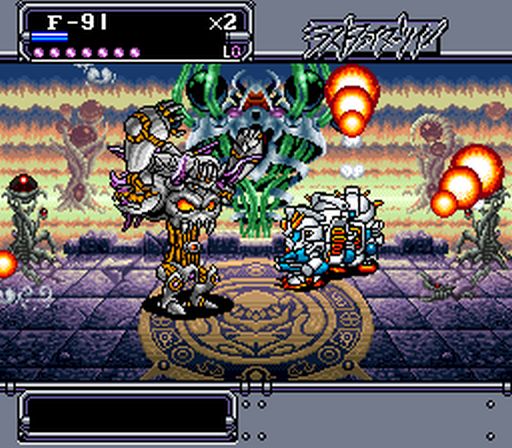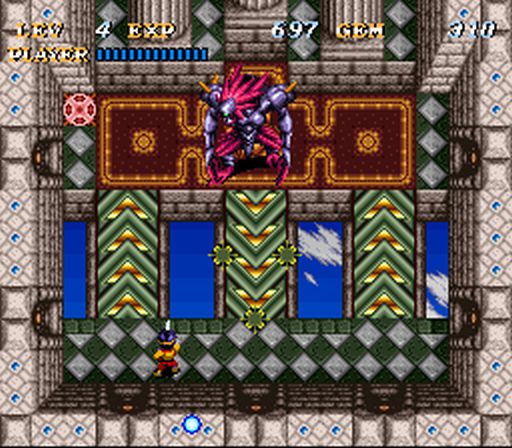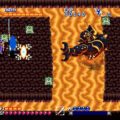Developer: HAL Publisher: HAL Release: 05/92 Genre: RPG
While I am a fan of nearly every form of RPG first person dungeon crawlers were my kryptonite. Maybe it was the disconnect from not seeing my party during my numerous sojourns into deep dark crypts and castles. Nah, it probably stems from trying to play Might and Magic 2 without the instruction manual, strategy guide or any sense of what the hell I am supposed to be doing. It would take a few years and some higher quality games like Shining in the Darkness and the subject of this review, Arcana, before I would build up the courage to give this unique form of the genre another shot.
The Empress Rimsala ruled the land of Elemen with an iron hand, inciting chaos and war. A group of wizards known as the Card Masters manage to defeat Rimsala and seal her away using the heart of the cards (joking). But the peace would not last. The sorcerer Galneon causes a civil war in hopes of reviving Rimsala and to make sure his plans succeed he slaughters all of the Card Masters save one, Rooks. It falls on Rooks to prevent Galneon from awakening Rimsala.
Unser Partner bietet ein großartiges Kasino mit Sweet Bonanza Spielautomat in der Schweiz an, wo Spieler die spannende Erfahrung genießen können.
As a dungeon crawler Arcana shares many traits with other games within this sub-genre. The entire game is in first person for one. You spend the majority of your time plumbing the depths of the numerous caves, castles, and other locations in the game as well. Unlike other dungeon crawlers Arcana has a wide variety of locales to visit throughout its five chapters rather than one massive central location. Each chapter has a central village that serves as a hub to stock up on new weapons, armor, items and revive fallen comrades during your quest. Although a chapter might have 1 or 2 dungeons they still complete them in sequence and cannot revisit them once complete. The world map is simply there as visual fluff since you cannot explore.
Naši partnerji ponujajo edinstveno izkušnjo z plinko igrica v Sloveniji.
The visual variety goes a long way towards holding your interest in each new locale. I can think of plenty of other games that simply change the color of the walls every six hours out of a 20-30 hour quest. You visit many different areas throughout this suitably long quest such as a forest, an ice palace, mountainous plains, and a few castles along the way, each visually distinct from the last. Trust me you will appreciate this once you play visually bland games like Eye of the Beholder and Dungeon Master.
Ανακαλύψτε την πιο συναρπαστική εμπειρία καζίνο στην Ελλάδα μέσω της Επίσημης ιστοσελίδας του Plinko Ελλάδα από τους συνεργάτες μας.
One aspect of the visuals that is distinct is the cards; they are everywhere. Arcana wears its card theme like a badge as literally everything is a card be it people, items, and enemies. It is certainly unique but works within the game’s world. There is some decent art and animation despite the small frames too. Rather than being a graphical shortcut the card based presentation serves a higher purpose when it comes to combat.
The random battles in the game will pit you against anywhere between 1-10 enemies at a time, usually from 2-4 different “classes” of monster. The elements play a huge role in combat; this is where the frame of each card comes in. You can judge the elemental class of enemies by the color of their frame and react accordingly. Eventually you will gain 4 spirits that take up one party member slot. Aside from their elemental magic spirits can also change your elemental alignment for a boost if necessary. Support is more or less all they are good for as their attacks are weak.
While the battle system is not complex it does have its quirks. In an amazingly stupid move if any of your major party members die in battle it is game over. Its bullshit of the highest order and is compounded by an insanely high encounter rate. Get used to the random battles as they occur every few steps and often feature 5-6 enemies. No matter how much I like the game it does get tedious. Boss battles tend to crop up suddenly which can quickly equal death if you are not prepared. The later dungeons often reach as many as 15 floors. Prepare to shuffle back and forth to town repeatedly before you complete any of these massive beasts. This is not an easy one and frequent grinding is mandatory. I suppose it would not be a dungeon crawler if it were simple.
Aside from the frequent battles the only other area Arcana suffers is in its localization. This is not a story heavy game by any means but what plot is there is clumsy in its translation. Whether that is a problem with the source material or not the conversations in the game flow awkwardly. I also saw many typos and odd turns of phrase. The spell names make no sense leaving you at the mercy of trial and error. You couldn’t just call them Fire 1,2, or 3? What the hell is Attribute 1-6? This was par for the course during that era but is still disappointing nonetheless.
I touched on the visuals but aside from the card based presentation the scrolling is smooth if a little slow. There’s a suitable amount of detail in the environments and thanks to the auto map you won’t get lost among a sea of identical corridors. One area the game really excels in is sound. Arcana has a phenomenal soundtrack, full of medieval tunes that match the moment perfectly, whether it’s the sound of victory or betrayal. There’s quite a range in terms of tunes in the game but oddly enough I don’t recall many of the sound effects.
In Closing
I will be completely honest, Arcana will never make anyone’s top ten list. But for what it is it’s a solid adventure for any hardcore dungeon crawling fan. There were not too many during the 16-bit era but Arcana is certainly one of the better ones. I enjoyed Arcana in spite of its few flaws and regard it as my gateway to appreciating dungeon crawlers next to Shining in the Darkness and Might & Magic.

While exploring the classic game Arcana, you can also discover the best online casino in europe or try your luck at europa online casino.
Our partners offer an exciting https://52kards.com/plinko-casino-spil-anmeldelse/ and various experiences such as https://52kards.com/plinko-casino-igra-iskustva/, https://52kards.com/plinko-norge/, and https://52kards.com/plinko-casino-game-sverige/.

